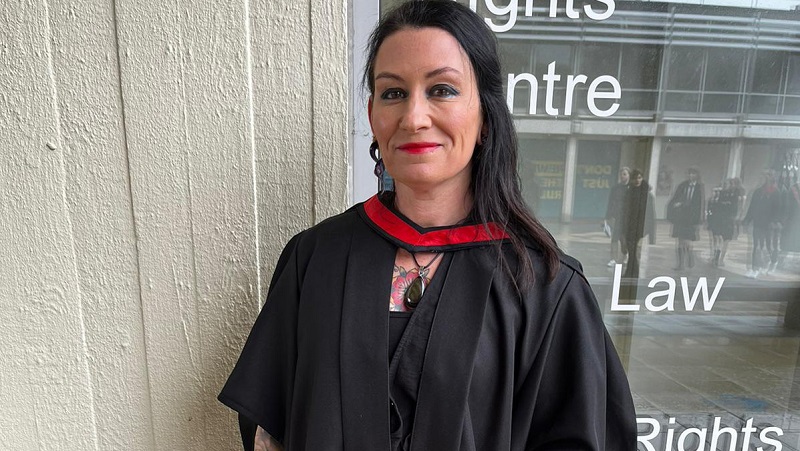Michele Stephens works as an administrator in the Essex Law Clinic and is currently midway through a two-year graduate visa, which she gained following her successful completion of a Master of Laws at Essex.
Originally from New Jersey in the United States, Michele was a senior lecturer in history at West Virginia University, when she decided to uproot and come to the UK to do a Master’s (LLM) in International Human Rights Law in 2020.
"Though my professional background is in Latin American history and indige, I have always wanted to develop further knowledge around European history and the development of law. I also felt that studying law would be beneficial in underpinning my research on gender-based violence and how countries develop laws to combat that. A friend of mine told me that the Essex Law School had a really good reputation.”

The visa process
Michele originally came to the UK on a standard 18-month student visa.
“I love England and have dear friends here, so I wanted to stay. I couldn’t find a job on my student visa, so I knew I’d need a more unrestricted visa in order to find work”.
The graduate visa gives students the right to stay in the UK for two years after the completion of a Bachelor’s or Master’s Degree, or three years after a PhD, to look for a job without the requirement of sponsorship. Michele had returned to the US after completing her Master’s, so she applied in March 2022 while back in the UK visiting family.
“The process was very easy. I had a quick interview and biometrics done in Chelmsford. It was easier than applying for my student visa. The biggest issue with the application process is that you must be in the UK to apply.”
She also had advice for students considering applying. “Save up while studying, because the visa is very expensive”.
The cost currently stands at £822 for the application fee and a £624 healthcare surcharge which is payable for each year you stay in the UK on the visa.
Finding work
Michele’s application was successful and she quickly found employment after her Law supervisor told her about the vacancy at Essex.
“I got a job with the Essex Law Clinic in May 2022, so I had my one-year anniversary earlier this year. I administer the Law Clinic, working with clients, students, and supervisors. This involves co-ordinating clinic bookings, triaging cases, organising training, and working with academics to plan projects. Initially, it took a couple of months to settle in, but it’s been a really good year. I love helping clients get legal advice.”
Michele was glad she chose the graduate route after completing her studies because of the flexibility it offers, saying “There’s no restrictions on what you can do, which is good.”
The future
The graduate visa in itself does not lead to permanent residency in the UK. However, it provides the opportunity to gain two or three years' work experience and the possibility of eventually securing a skilled worker visa through sponsorship from an employer.
With her graduate visa expiring in March 2024, this is the route that Michele is hoping to take. She sees her future here in the UK and very much wants to continue contributing to the work of the Essex Law Clinic.
For further information about the types of visas available for graduates, take a look at our Working in the UK after your studies page.




